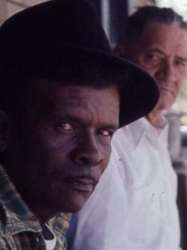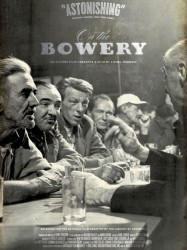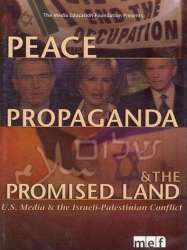Arab-Israeli Dialogue is a american film of genre Documentary directed by Lionel Rogosin released in USA on 1 january 1974
Arab-Israeli Dialogue (1974)

If you like this film, let us know!
Arab Israeli Dialogue is the tenth and final film directed by American independent filmmaker Lionel Rogosin. It is a filmed debate between the Palestinian poet Rashed Hussein and Amos Kenan, shot in the basement of Rogosin's Bleecker Street Cinema by Louis Brigante.
Though Rogosin would live until 2000, he did not complete another film in his lifetime, causing him immense personal and artistic frustration.
Comments
Leave comment :
Suggestions of similar film to Arab-Israeli Dialogue
There are 8 films with the same director, 8959 with the same cinematographic genres, 13323 films with the same themes (including 55 films with the same 10 themes than Arab-Israeli Dialogue), to have finally 70 suggestions of similar films.If you liked Arab-Israeli Dialogue, you will probably like those similar films :

Out (1957)
, 25minutesDirected by Lionel Rogosin
Origin USA
Genres Documentary
Themes Films about immigration, Documentary films about law, Documentary films about historical events, Documentary films about politics, Political films
Rating64%





À la suite de l'Insurrection de Budapest de 1956, des Hongrois fuient le pays et se réfugient à l'étranger.

Good Times, Wonderful Times (1966)
, 1h10Directed by Lionel Rogosin
Origin USA
Genres Drama, War, Documentary
Themes Documentary films about war, Documentary films about historical events, Political films
Rating67%





Un cocktail mondain à Londres. Alors que les convives font preuve d'une suffisance infinie et pérorent sur les drames du monde, des images viennent fracasser cette frivolité pour redonner du sens et de la chair à ce qui n'est plus pour eux qu'un vague bruissement du monde, alors que celui ci est en feu.
 , 1h25
, 1h25Directed by Lionel Rogosin
Origin USA
Genres Documentary
Themes Films about the labor movement, Documentary films about politics, Political films
Ce film porte sur une coopérative gérée par des Noirs et des Blancs.

On the Bowery (1957)
, 1h5Directed by Lionel Rogosin
Origin USA
Genres Drama, Documentary
Themes Films about alcoholism, Medical-themed films, Films about drugs, Documentaire sur une personnalité, Documentary films about cities
Rating72%





The film chronicles three desperate days in a then impoverished lower Manhattan neighborhood, New York's skid row: the Bowery. It is the story of Ray (Ray Salyer), a railroad worker, who drifts on to the Bowery to have a drunken spree after a long bout of laying tracks and then falls in with a band of drunks who help him spend his money.

Come Back, Africa (1959)
, 1h35Directed by Lionel Rogosin
Origin USA
Genres Drama, Documentary
Themes Films set in Africa, Films about racism
Actors Miriam Makeba
Rating70%





Come Back, Africa comprises a storyline acted out by black South Africans from whose own experiences the film's events are drawn.
 , 1h20
, 1h20Origin USA
Genres Documentary
Themes Films set in Africa, Films about religion, Documentary films about law, Documentary films about war, Documentary films about historical events, Documentaire sur une personnalité, Documentary films about politics, Documentary films about religion, Political films, Films about Jews and Judaism
Rating81%






Budrus (2010)
, 1h10Directed by Julia Bacha
Origin USA
Genres Documentary
Themes Films set in Africa, Films about religion, Documentary films about law, Documentary films about war, Documentary films about historical events, Documentaire sur une personnalité, Documentary films about politics, Documentary films about religion, Political films, Films about Jews and Judaism
Rating76%





Jordana Horn in The Jewish Daily Forward states that: Budrus [is] a documentary by Julia Bacha that examines one West Bank town’s reaction to Israel’s construction of the security barrier. The town, with a population of 1,500, was set to be divided and encircled by the barrier, losing 300 acres of land and 3,000 olive trees. These trees were not only critical for economic survival but also sacred to the town’s intergenerational history. The film tells the story of Ayed Morrar, a Palestinian whose work for Fatah had led to five detentions in Israeli jails, but whose momentous strategic decision that the barrier would be best opposed by nonviolent resistance had far-reaching ramifications.

At the Green Line (2005)
, 52minutesOrigin Israel
Genres Documentary
Themes Films set in Africa, Films about religion, Documentary films about law, Documentary films about war, Documentary films about historical events, Documentaire sur une personnalité, Documentary films about politics, Documentary films about religion, Political films, Films about Jews and Judaism
 , 58minutes
, 58minutesDirected by Benny Brunner
Genres Documentary
Themes Films set in Africa, Films about religion, Documentary films about law, Documentary films about war, Documentary films about historical events, Documentaire sur une personnalité, Documentary films about politics, Documentary films about religion, Political films, Films about Jews and Judaism
Rating75%






Close, Closed, Closure (2003)
, 53minutesDirected by Ram Loevy
Genres Documentary
Themes Films set in Africa, Films about religion, Documentary films about law, Documentary films about war, Documentary films about historical events, Documentaire sur une personnalité, Documentary films about politics, Documentary films about religion, Political films, Films about Jews and Judaism
Rating63%





 Connection
Connection